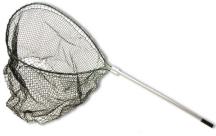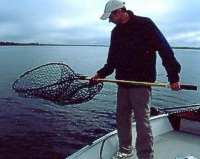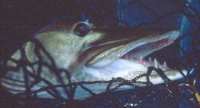
Beckman
Net Company
- We strongly believe in
the quality and workmanship of our products. Each and every net
is hand made. All our nets are thoroughly inspected by one of
our family before we put the name Beckman on
it. Our aluminum yoke assembly has a lifetime guarantee against
breakage, our net hoops are made from lightweight drawn
aluminum, all our handles are drawn aluminum. Which make them
nearly indestructible under normal use. Great Muskie nets! |
 |
Net Landing Fall Trophies By Tim Allard
With fall fishing in full swing, chances of landing
a chunky trophy are better than ever. As water temperatures drop and
anglers bundle up, hand-landing is less of an option and nets become
crucial. Yet, having a net is not enough. Proper technique and
communication are crucial to ensuring a quick landing and healthy
recovery of released fish.
Net Placement and Positioning
 Store your net so that it is always accessible in your boat. Keep it
away from dangling baits, cleats, rods, and other hazards. When
holding a large net, grab excess netting with the hand closest to
the loop to prevent it from snagging objects as you move. Your
releasing tools should also be within arms reach. Large fish always
add a little chaos, excitement and adrenaline into the angling
equation, so be prepared to land this giant properly. Store your net so that it is always accessible in your boat. Keep it
away from dangling baits, cleats, rods, and other hazards. When
holding a large net, grab excess netting with the hand closest to
the loop to prevent it from snagging objects as you move. Your
releasing tools should also be within arms reach. Large fish always
add a little chaos, excitement and adrenaline into the angling
equation, so be prepared to land this giant properly.
The constant in landing a fish is to net it head
first, with two options for net placement. One method is to lower
the net into the water and then lead the fish into the lowered net.
The downside of this method is that fish often spook after seeing
the net, causing additional stress to the fish and could cause a
boat side break off. Furthermore, it can be difficult to hold large
nets or position nets in strong currents.
A better approach is to hold the net above water
until the fish is within netting range. Positioning is influenced by
boat size and layout as well as water conditions but if using a net
with a short handle, position the netter in front of the angler.
With long handled nets, the above positioning is an option, but
standing side-by-side can be more effective.
The Landing Process
As the fish gets within netting range, decide if it is ready to be
landed. A good habit is that the angler playing the fish decides
when the fish is ready to be netted. The next steps should be
executed in one full motion - plunge the net downwards in front of
the fish's head (release excess netting at this point if using a
large net), continuing to move lengthwise under the fish and then
lift the net upwards once you reach the tail.
If fishing with people new to netting, explain that
moving a net through the water can create a lot of resistance so
they should be positioned to put some force into the netting motion.
Ensure the net is submerged about a foot in front of the fish
otherwise it may bump the fish and could dislodge the hooks, causing
an early release.
 Once the fish is netted release the line tension on
the lure by lowering the rod and disengaging the reel. This allows
the hooks to easily be removed and also minimizes the risk of the
bait snapping backwards if the fish suddenly shakes the hooks. Also
while in the net, ensure the fish is kept in the water as much as
possible. Once the fish is netted release the line tension on
the lure by lowering the rod and disengaging the reel. This allows
the hooks to easily be removed and also minimizes the risk of the
bait snapping backwards if the fish suddenly shakes the hooks. Also
while in the net, ensure the fish is kept in the water as much as
possible.
Using nets to land fall trophies is not only an
excellent method to reduce stress on a fish, but also has benefits
to anglers. Using a net will keep hands and clothing dry from cold,
fall waters. If you have an old net you may want to consider
upgrading your set-up. Higher-end nets feature synthetically treated
nylon that is both hook resistant and does not remove the fish's
protective slime like knotted, untreated nylon. A quality net will
last for many seasons and using top of the line equipment will
increase your confidence when it's time to net that fat, fall fish.
|